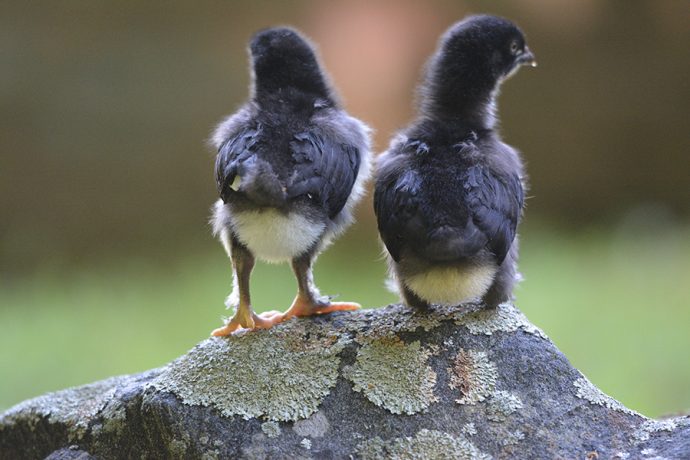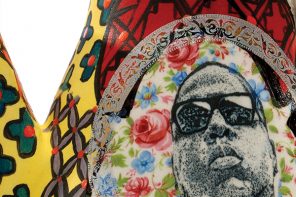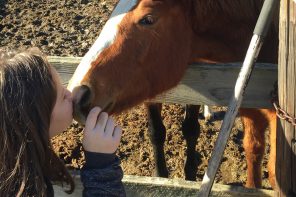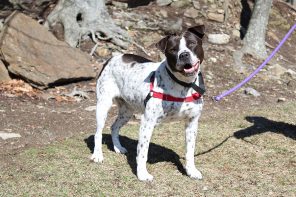The diverse shades of eggs sold by Pound Ridge Organics — a bright mix of beige, olive green, blue and pink — don’t just make for a pretty picture.
They’re the product of a philosophy of raising and caring for rare breeds of chickens that has made the farm the first in Westchester County to be certified humane.
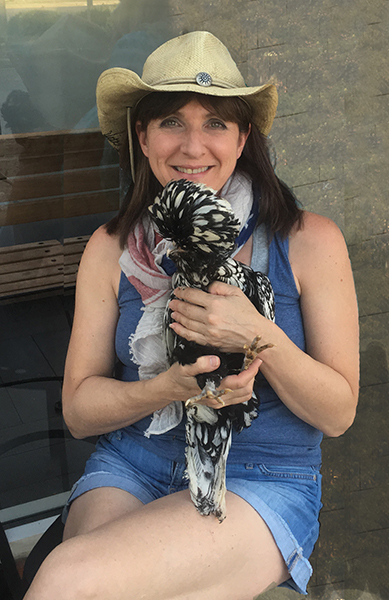
The farm and co-op, started in 2012 by Donna Simons, is recognized for its commitment to ethical and environmental standards for its animals and is both Animal Welfare Approved and Certified Humane by the two eponymous nonprofits. Pound Ridge Organics has also been recognized by the American Society for the Prevention of Cruelty to Animals, received the Slow Food “Snail of Approval” and is “A” rated by the consumer group BuyingPoultry.com.
From an 18th-century Pound Ridge homestead near the state line in Scotts Corners, Simons grows herbs, taps maples, keeps honeybees, bakes goods and creates jams and preserves. But the farm may be best known for its heritage-breed chickens, usually about 50 in total (plus one duck), that produce eggs.
The heritage title is given to breeds of chicken that are rare or even endangered — some of which trace their lineage back more than 200 years. Unlike industrial chickens designed to grow and produce quickly, the birds come in all shapes and sizes.
“These birds are lean; they’re spry, thin and tall,” Simons says. “Not all of them, some are even really huge. I have a Jersey Giant you would think is a turkey, she is so big. “
Simons feeds the birds a healthy diet that includes locally sourced feed and fruit and veggies. They’re also allowed to forage for their own grub — ticks, bugs, worms, frogs, even snakes and mice.
The nutrient heavy diet helps produce a richer yoke in the eggs.
The chickens are not slaughtered when they stop laying eggs, allowing them to live a full life and raise younger birds.
Pound Ridge Organics also includes a small hatchery. Chicks hatched on the farm are hand-delivered to local farmers, allowing the farmers to keep heritage birds without subjecting them to the stressful and sometime fatal shipping process.
The co-op business has grown to include hundreds of customers mostly in Westchester and Fairfield counties. Simons describes herself as a “clean authentic food curator,” as her co-op draws produce and other products from farms that she ensures follow the same environmental and welfare standards.
Through her farm and working with local farmers, Simons’ co-op offers a range of products, including Pound Ridge Organics label jams, maple syrup and honey; organic produce; local cheese and dairy products; breads and baked goods; and high welfare, certified organic meats.
WAG caught up with Simons for a few questions by phone and email just after much of Westchester County was digging out and assessing the damage from several nor’easters.
Can you tell me the history of the farm?
“We had egg-laying hens and a vegetable garden for many years while my three daughters were growing up. I worked professionally in the food business as a chef garde manger, baker, artisan producer and private chef.
“Due to my buying preferences and my ability to produce food from scratch, I was a bit naïve about the quality, welfare and ethical issues happening in the commercial food system.
“I returned to college in 2009 (for graphic design) and attended a residency about food and the environment, followed by a lecture about antibiotic use on factory farms and its deleterious effect on the planet, farm animals and humans. I decided to choose this topic for my thesis and spent the next two years collecting data and sketching concepts. The culmination of my research was an art exhibition entitled ‘Bon freakin’ Appétit,’” a visual narrative and call to action to seek alternatives to factory farming.
“Following this project, I had a deep understanding of the history and current state of the food system and felt a responsibility to be directly involved in helping make change. While doing my thesis research, I began sourcing local meat, poultry, produce and eggs from local farms for my family and friends. By 2012, Pound Ridge Organics began to take form.”
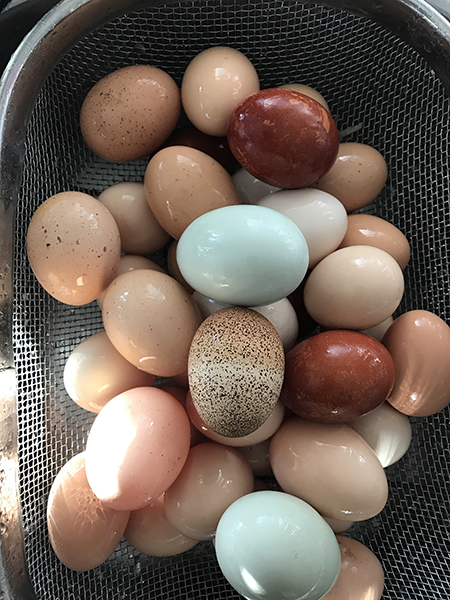
As an artist and a farmer, do you find there are similarities in the two pursuits?
“I feel that there is a similarity in the temperaments of artists and farmers, so in that sense it was natural for me. While vegetable farming is more science-based, animal farming relies on a deep understanding of behavior — more akin to the sciences of sociology and psychology.
“A farmer has to be sensitive to the behavior and dynamic of the flock in order to understand their needs. Artists use observation and our senses to create art. We watch, observe and get impressions so we can create imagery, music, dance, even comedy and drama, and believe me there is a lot of comedy and drama in a chicken flock. There’s certainly a connection between art and food as well. Aesthetics are aesthetics, whether olfactory, taste or visual. I use color theory, composition and texture any time I plate a dish.”
Why did you decide to pursue the humane certifications?
“High welfare buzz words have been used to manipulate consumers to believe that the food they are buying meets certain perceived standards. When you research the actual legal definitions of many of these terms, you find that the actual standards are far beneath your expectations. Some claims are actually inhumane such as ‘fed a vegetarian diet,’ while others make claims that make no sense at all like ‘natural.’ Additionally without audits and accountability, producers can claim anything they want, until of course they get caught. Animal Welfare Approved standards are in alignment with my husbandry practices and I am happy to go through the effort to continually verify that through the audit process.”
What did your farm need to do to become certified humane?
“It requires an annual audit, which includes a farm visit every 11 months, review of records, showing the auditor feed and supplements and copies of labels, sharing health records and egg-laying records, etc.
“I always enjoy the audits. They enable me to chat about my birds (without being perceived as a Crazy Chicken Lady).”
Where can people buy your products?
“Right here at the farm market in our carriage house. The co-op initiation fee is only $50, which provides access to our meticulously curated local food; delicious seasonally based recipes; tasting and first dibs on our events. The public is welcome to come on co-op pick-up day to shop for any surplus. We suggest calling ahead since the schedule changes due to factors beyond our control (like nor’easters). We plan to expand our hours of operation — so stay connected with us.”
A list of the exact standards for the Animal Welfare Approved designation is available at animalwelfareapproved.us. Certified Humane’s standards are available at certifiedhumane.org. For more, visit facebook.com/PoundRidgeOrganics.

